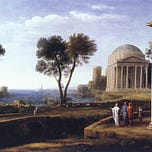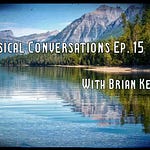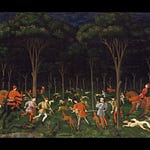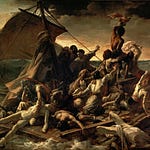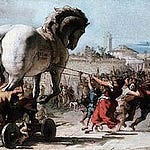Before we begin, please be sure to see William’s essay on this book of the Aeneid over on his stack.
Last time we heard Aeneas tell the tale of the destruction of Troy and the deaths of both Priam and Aeneas’ wife Creusa—events that Homer did not get to in the Iliad. Today we will read and discuss Aeneas’ “odyssey”.
Thrace and Crete: The Two False Starts
To begin with, Aeneas does not know that he needs to be headed to Italy. Thus we get two false starts. In the first of these, the Trojans land in Thrace and Aeneas immediately turns to building walls. He does this later as well. He yearns for protection from the dangers of the world. Perhaps this is the one way in which Aeneas is not entirely trusting of a good outcome for his fate; that is to say, walls represent a reliance on one’s own arms so to speak. It is understandable that Aeneas wants to do this, but fate or the will of the gods means everything, and this is perhaps something that Aeneas does not entirely trust in even though he is exceedingly pious. The walls at Troy may very well have been strong enough to keep out the Greeks if neither side received divine support, but they ultimately weren’t enough to save the Trojans because of Zeus’ will or because of fate. So, again, it is very understandable that Aeneas wants walls first and before anything else, but perhaps this is representative of him having not thought things through all the way or wanting to take matters into his own hands since he has already seen Troy burn.
The Trojans leave Thrace because plants bleed the blood of a Trojan, Polydorus, who tells them to move on from this polluted place. One interesting thing to note, is that Aeneas relates the treachery of the Thracians in killing Polydorus and taking his gold once they sensed that the Greeks would win and he says that in doing so, they “broke all human laws” (in the Fagles rendering). It seems more like they broke one law, but Aeneas is a very moral man. Following the law is important to him, and it would appear that he wishes to live in a world where human law means something real, instead of something like naked or raw force or nature being that which is actually real, though it is often covered over by convention.
After consulting with the priestess at Delos, Aeneas consults with his captains, especially his father, Anchises, who thinks he knows the ancestral location that the priestess has in mind, and so they set out for Crete. It turns out that there are abandoned buildings in Crete, so it looks ready made for them to inhabit–like a divine gift. Again, Aeneas’ first task is to start building walls; many men get married; and then Aeneas turns to drafting laws. If all goes well, the walls will keep out the nasty people who break human laws and the Trojans will happily submit to the wise laws of their founder. However, this is not to be either as a plague strikes the Trojans. Fate acts quickly and forcefully. Why was this the best way to tell the Trojans to move on? Why not the gentler way of before? One of my unanswered questions from this section is: why don’t the gods make it clearer to Aeneas earlier, where he needed to go? Why permit the false starts? Is there something that they learn from these experiences? Are they supposed to learn that fate, while iron, is inscrutable without constantly checking with the gods?
However this may be, they are told by the household gods who were contacted by Apollo that they need to go to Italy. Interestingly, Anchises relates that he didn’t listen to Cassandra when she pointed this very thing out, but she wasn’t believed. Her prophecies were measured by the expectations of unassisted human reason, which found the prophecy to be unlikely. In terms of my question above, it seems important to pay attention to when Aeneas and the Trojans rely on reason and when they rely on revelation and why. This is an especially interesting question because Virgil outlined the injustice and cruelty of the gods in the opening lines.
Strophades, Actian, and Buthrotum
Aeneas and his men see apparently unguarded cattle but then have to confront a fleet of Harpies. After some combat, the Harpy Celaeno speaks: “take what I say to heart and stamp it in your minds” and goes on to mention generally bad news: there will come a day they gnaw on platters. As an aside, I’m curious if there is anything significant in the word order, namely, are our hearts or our minds more determinative in how we come to a decision or hold onto a conviction? The harpy lists the heart first…
Actian features games and a trophy is mounted with the spoils of the first Greek that Aeneas killed in book 2 when he was disguised with Greek gear.
In Buthrotum, we see Hector’s wife Andromache. Now to be clear, the reader experiences the compressed narration as a couple of days, but the ground we have covered so far must actually be years, for we learn that Andromache was forced to be the bride of Achilles’ aggressive son Pyrrhus; she has born him a son and been passed on to another man. Pyrrhus by the way, was killed at his father’s altar by Orestes, just as he killed Priam at an altar. Is this a way in which Virgil is suggesting that those who live a might makes right kind of life will indeed be dealt poetic justice in this life? Or, is this what Aeneas thinks?
However that might be, Buthrotum is a miniature Troy. Andromache spends her days longing for Hector. There is something kind of eerie or sad in seeing this city. It is like Disneyland but worse. It is a return to tradition, and an attempt to recreate the past, except that it can never house the things from the past that they really want: the people. We cannot return; the only way out is through.
Helenus, the prophet king of this mini-Troy offers an extremely detailed account of what Aeneas will face and what he needs to do to be successful. Suffice it to say, the Trojans cannot take the quickest route if they want to be successful. I’m reminded of a line from Xenophon’s Memorabilia:
“Hesiod too says somewhere, ‘It is easy to choose badness even in abundance; the road is smooth, and it lies very near. But immortal gods have placed sweat before virtue. The to it is long and steep and rough at first. But if one ever arrives at the peak, then the going is easy, although it was hard’” (2.1).
The Trojans will have to sweat and suffer, but the founders of Rome will make it to the peak.
However this may be, Andromache gives gifts to Iulus / Ascanius and speaks directly to him as he reminds her of her dearly departed son Astyanax–reminding us in turn of Hector’s last conversation with Andromache in the Iliad where she implores him not to fight beyond the walls.
The Sea Journey
Anchises is now increasingly calling the shots. Just as old impotent Priam ruled over the Trojans, now impotent Anchises is functionally in charge. Is it the case that especially pious societies are more vulnerable to being ruled by the old? That priestly power can be wielded by the infirm?
By taking the longer route, Aeneas is able to pass by Charybdis in such a way as to lose no men, outdoing Odysseus. So too do they avoid losing men to Polyphemus the Cyclops. Odysseus’ carelessness toward his men is further highlighted by his having left this man Achmaenides behind, who now begs for asylum aboard a Trojan vessel. The discussion with Achmaenides is a very curious episode that parallels the perfidious Sinon who helped make the plausible the fiction that the Trojan horse was a gift to Athena. In both cases, Sinon and Achmaenides claim to have been wronged by the Greeks. Strikingly, no suspicion is aroused in the Trojans! Now, it would appear that they were correct in taking him at his word, but prudence would seem to dictate the necessity of taking a little bit more caution when confronting Greeks. Perhaps Virgil means to point to the Trojan / Roman magnanimity. That even after being wronged in the maximum way possible way, they can still be gracious with the defeated or with the weak.
Anchises passes away at the end of the book. This is a big blow to Aeneas, but one wonders if this in some sense a good thing. Troy went down under the command of Priam; the founder of a new people should be younger; he should have fire burning brightly in his soul that grows more powerful when faced by the winds of fortune; not a flickering light that could be blown out by a child.

